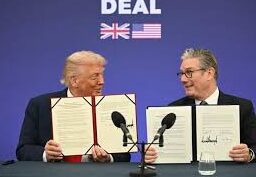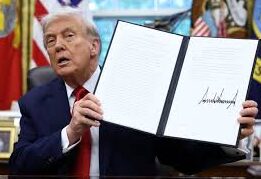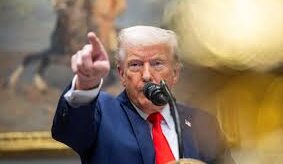The UK government says it has secured£ 150bn worth of US investment which it hopes will produce 7,600 jobs.
The advertisement came on the day that US President Donald Trump and Prime Minister Sir Keir Starmer inked an agreement dubbed the” Tech Prosperity Deal” which sees enterprises similar as Microsoft and Google pledging to spend billions in the UK.
It’s part of a wider plan by the UK to consolidate profitable ties with the US. still, some diligence, similar as sword, have been dealt a blow with a proposed deal to cut tariffs remitted.
Several big medicines companies, similar as AstraZeneca, have also halted investment plans, claiming the UK is an” decreasingly grueling ” country to do business in.
The vast maturity of the£ 150bn investment-£ 90bn- will come from Blackstone over the coming decade, although how most of this plutocrat will be spent has yet to be decided. The US private equity establishment blazoned in June it would spend£ 370bn across Europe over 10 times.
The technology deal will see the UK and US co-operate in areas including artificial intelligence( AI), amount computing and nuclear power.
Microsoft has pledged to spend£ 22bn in the UK over the coming four times, while Google is to invest£ 5bn over the coming two times to expand an being data centre in Hertfordshire.
Starmer said the investments were” a testament to Britain’s profitable strength and a bold signal that our country is open, ambitious, and ready to lead”.
The PM is keen to make the UK a destination for US investment in an attempt to boost Britain’s frugality.
While it’s hoped the investments will induce thousands of jobs in the times ahead, it comes at a time when domestic businesses appear to be decelerating investment due to advanced running costs.
The government says 7,600 jobs will be created by the investments, but over the time to August the number of people on UK payrolls has fallen by an estimated 127,000, according to the Office for National Statistics. vacuities were down by 119,000( 14) in June to August 2025 from the position of a time ago.
numerous enterprises have criticised adding costs, similar as having to pay further in National Insurance and the minimal pay envelope, as reasons for decelerating investment.
In recent days, pharmaceutical companies have stressed other challenges to investing in the UK. US giant Merck rowed back on a plan to invest£ 1bn after condemning consecutive governments for undervaluing innovative drugs. rather, it’ll move exploration to the US.
AstraZeneca also broke plans to invest£ 200m at a Cambridge exploration point, a design anticipated to produce 1,000 jobs. It has also switched investment to the US.
Meanwhile, plutocrat is also flowing from UK enterprises to the US. In the investment advertisement, the government refocused to medicines giant GSK investing nearly£ 22bn in R&D and manufacturing in the US over a five- time period.
Where is the UK investment going?
• Blackstone’s large investment is in addition to the£ 10bn it preliminary blazoned for data centre development in the UK
• Real estate investment trust Prologis is set to invest£ 3.9 bn into the UK’s life lores and advanced manufacturing in Cambridge and Daventry
• Palantir is invest up to£ 1.5 bn in UK defence invention and plans to produce up to 350 new jobs.
• American tech company Amentum plans to produce further than 3,000 jobs across Glasgow to Warrington and the Midlands
• Boeing has said it’ll convert two 737 aircraft in Birmingham for the US Air Force, which would be the first USAF aircraft erected in the UK for further than 50 times
Business and Trade Secretary Peter Kyle said the planned investment reflected growing confidence in the UK’s artificial strategy.
” These record- breaking investments will produce thousands of high- quality jobs across the UK,” he said.
But former Deputy Prime Minister Sir Nick Clegg, who also used to be Facebook’s chairman of global affairs, told the BBC’s moment programme that the investment was” motes from the Silicon Valley table”.
He called for” some perspective” to be applied to the” hype”, and that the deal did n’t break the UK’s” imperishable achilles heel”, which was that British launch- ups tended to end up in the US as they seek investment.
” Not only do we import all their technology, we export all our good people and good ideas as well,” he said.
He said the UK had to learn to” stand more on our own two bases”, rather than” cleave on to Uncle Sam’s fleece tails”.






